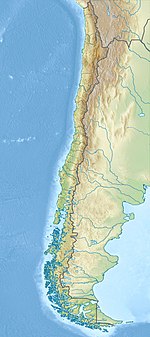Chillahuita is a dacitic lava dome in northern Chile. It may have formed after the Pleistocene,[2] although argon-argon dating on amphibole has indicated an age of 370,000 ± 40,000 years;[3] another age estimate is 107,800 ± 6,400 years.[4] It has an altitude of about 4,750 metres (15,580 ft). It formed in a single non-explosive eruption.[5]
| Chillahuita | |
|---|---|
| Highest point | |
| Elevation | 4,706 m (15,440 ft)[1] |
| Coordinates | 22°10′10″S 68°2′30″W / 22.16944°S 68.04167°W[1] |
| Geography | |
| Location | Antofagasta Region, Chile |
| Parent range | Andes |
| Geology | |
| Mountain type | Lava dome |
The flow moved northward and eastward from the vent over a terrain with slopes of 3-4°. The flow has a surface area of 11 square kilometres (4.2 sq mi) with a flat circular surface containing flow folds. Steep 200-metre (660 ft) high flanks limit the flow, which has a total volume of 4 cubic kilometres (0.96 cu mi). It is surrounded by a pumice deposit probably from the San Pedro volcano to the northwest.[5]
The eruption of the Chillahuita dome involved the entry of andesitic magma into a pre-existent shallow reservoir.[4] It appears to have been controlled by local fault systems associated with the Altiplano-Puna volcanic complex, which also has geochemical similarity with Chillahuita lavas.[5]
See also
editReferences
edit- ^ a b "Cerro del Leon: Synonyms & Subfeatures". Global Volcanism Program. Smithsonian Institution. Retrieved 2021-06-29.
- ^ Guest, J. E.; Sánchez R, J. (September 1969). "A large dacitic lava flow in northern Chile". Bulletin Volcanologique. 33 (3): 778–790. doi:10.1007/BF02596749. ISSN 1432-0819.
- ^ Polanco, Edmundo; Clavero, Jorge; Giavelli, Aldo. "Geología de la cadena volcánica Paniri-Toconce, Zona Volcánica Central, Altiplano de la Región de Antofagasta, Chile" (PDF). biblioserver.sernageomin (in Spanish). Santiago: SERNAGEOMIN. Archived from the original (PDF) on 19 November 2015. Retrieved 19 November 2015.
- ^ a b Scheinost, Alexander; Scaillet, Bruno; Aguilera, Felipe (2023). Chillahuita: a torta-type dome in northern Chile. Goldschmidt 2023 Conference. GOLDSCHMIDT.
- ^ a b c de Silva, S. L.; Self, S.; Francis, P. W.; Drake, R. E.; Carlos, Ramirez R. (1994). "Effusive silicic volcanism in the Central Andes: The Chao dacite and other young lavas of the Altiplano-Puna Volcanic Complex". Journal of Geophysical Research. 99 (B9): 17805. doi:10.1029/94JB00652. S2CID 128766861.
External links
edit- "Chillahuita". Volcano World. Oregon State University. Retrieved 19 November 2015.
